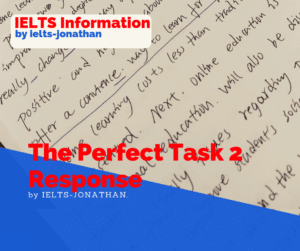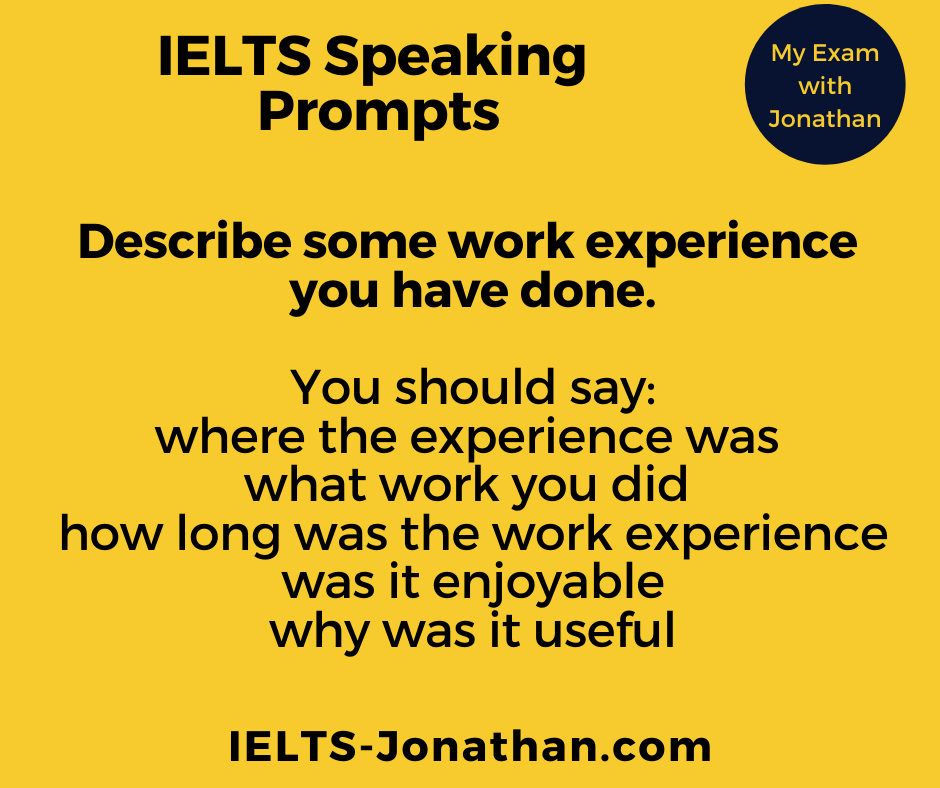Did you know that the second part of the IELTS Speaking test can be the most difficult for candidates, even Native Speakers.
But don’t despair it can also be the easiest part, and the most enjoyable.
There’s a good reason for this part of the IELTS test, and I will explain this below.
One reason for Part 2 is to allow the candidate speak at length and meet the fluency criteria.
A Second reason is to allow the examiner to grade your ability for the follow up questions in Part 3.
They are trained to listen carefully for language range, grammar accuracy and pronunciation is normal speech.
They can then chose the best question sets in Part 3 that allows you to display your real language ability. So it’s important to fill that 2 minutes the best you can.
Part 2 Structure
You are given a set of prompts and a question.
The prompts are not particularly challenging, but follow a pattern to give you ‘ideas’ and ‘structure’ for your 2 minute talk.
This gives the examiner ‘a further opinion‘ to your level, ready for Part 3.
One way to do well in this section is to try and relax.
A relaxed candidate always performs better and responds well.
If you don’t understand something, always ask the examiner to repeat the prompt question.
The examiner can’t help you directly, but repetition might help you understand the prompt better.
Other tips are
- Don’t give the examiner an opportunity to ask ‘can you say anything else about that’.
- Speak for the full 2 minutes until the examiner stops you.
- Don’t hesitate too much, you are allowed to make some mistakes, it’s natural.
- Connect your sentences and use the structure given in the prompt.
- Attempt to use complex sentences rather than short, simply ones.
and
- Don’t be afraid to correct yourself.
What if you really don’t understand the prompt or even worse the prompt doesn’t apply to you?
If you’re preparing for IELTS, and feel you cannot answer some of the speaking questions properly, simply because they really do not apply to your current life experience, then don’t worry as you’re not alone.
For example:
Q. Talk about an object you own that is especially valuable or important to you.
Problem: I have a quite spartan lifestyle and I don’t have any emotional attachment to any objects I own.
Q. Talk about an object that has had great influence in your life, and explain how it influenced your life.
Problem: While I could talk for hours about books that I love, I don’t really feel that there is a book that has truly influenced my life.
IELTS Speaking Topic: Work experience that you have done
Describe some work experience you have done.
You should say:
where the experience was
what work did you do
how long was the work experience
was it enjoyable
was it useful
So, the topic I am going to talk about is related to the work experience I gained at school. When I was younger, probably about the age of 15, all the pupils in my year had to take part in two-weeks of work experience as part of their vocational and academic timetable. What this meant was that instead of attending school, two weeks were spent in a company, an organization or a business and I suppose the experience was to give you a taste of working life.
In my city, we are quite lucky as there are many international companies and administration departments, so the work experience could be quite varied. There were also opportunities to work at the zoo, and in veterinary centres too. I had the chance to work in a national bank, and I if I am honest, the experience was a little disappointing. I thought it would be much more interesting than it was. For example, as I was young, I had no responsibility and was mainly observing and learning from what others were doing. I did some filing and collected documents and files from different departments so I could see some of the different kinds of work that takes place, but that was the limit.
At the end, I was given a report on my attitude and behaviour and I needed to write a small report as well. I think that it taught me something, probably that work is very different to school and college. I also realized that I didn’t want to work in a bank, so I think it was a useful experience, but others might not think so.
Now I have graduated, I am looking for an internship in an international company again. In many ways it might be a similar experience because I probably won’t have any responsibility at first, but I think I will enjoy this experience more because I want to work in this industry in the future.
Solution to this problem
IELTS is a test of your language ability, not intelligence or knowledge.
You may think the IELTS test is an interrogation, but you don’t really need to answer with the truth.
However, I would feel more comfortable with the be honest approach, even if it does not directly answer the question.
You would probably be able to answer more naturally, and therefore be more fluent.
Which one do you think is a better strategy?
You can use tips and information on this website to help make it easier to obtain a higher score, but remember you still need to work at learning the language to be successful.
Please share to someone you know and in the meantime take a look at my Facebook Page and Website for IELTS answers and you can also join my Facebook Group here too.
Good Luck
Jonathan
I’m Jonathan
I’ve taught IELTS and University English in more than a dozen universities and schools around the world.
I’m a parent, traveller and passionate about language teaching and helping students achieve their dreams.
Whilst living in Austria or working in Asia, I run IELTS courses to help students get to where they want to be.
If you are serious about IELTS, connect with me to see how I can help you.




